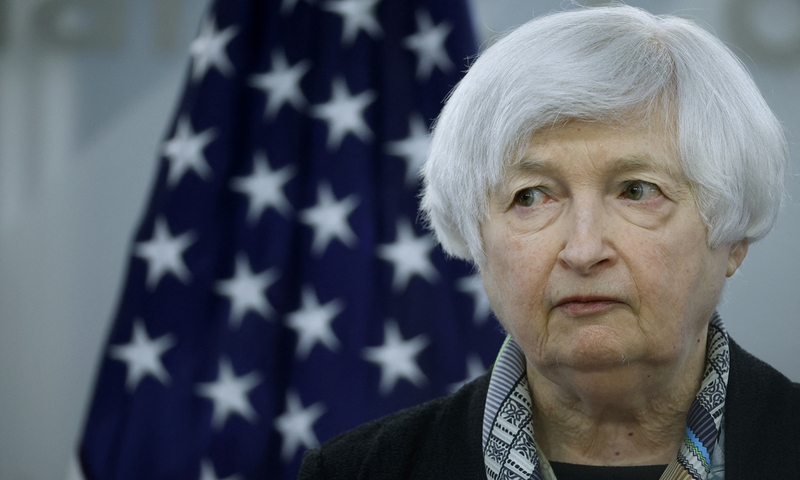(Source: Global Times, 2023-7-6)

US Treasury Secretary Janet Yellen addresses an Atlantic Council Front Page event on April 13, 2022 in Washington, DC. Photo: AFP
As we know, in the US, especially in Washington DC, there is a strong and active anti-China coalition. It includes the government, think tanks and strategic community in general. Anti-China is a form of political correctness these days in Washington. I lived and worked in Washington for quite several years at different periods, but for the first time, I found the atmosphere in Washington DC toward China is so toxic and irrational.
Can we shape a new framework for this relationship? The first question is whether this is desirable and the second is whether it is feasible. I think this is desirable because this relationship is in a very dangerous and worrisome situation. On one hand, the US has clearly defined China as its primary strategic competitor and rival, while China views the US as a major external political, economic and security threat. On the other hand, both sides do not want to cut off economic ties and they do not want a complete decoupling of two economies. Both sides do not want to fall into an all-out diplomatic confrontation because they still need to cooperate with each other on many international and global issues. Also, both sides do not want to run into a serious military conflict in the Taiwan Straits and the South China Sea, because the consequences would be disastrous.
So, it will require us to adapt to a framework to manage this very challenging and complicated relationship. Actually, China and the US do have a foundations for thinking about this framework. Last November, when Chinese President Xi Jinping met with US President Joe Biden, Xi tried to clarify China's intention by suggesting that China does not seek to change the existing international order or interfere in the internal affairs of the US, and has no intention to challenge or displace the US. Biden replied that the US respects China's system, does not seek to change it and has no intention for a new Cold War.
This kind of reassurances laid the ground for a serious discussion for both sides about a set of principles for this relationship. What this framework should like, here are three suggestions.
First, both sides should make it clear that they seek peaceful coexistence with each other. With both sides agreeing on this goal, they need to discuss how to make this relationship peaceful as it is competitive. The most important thing is to draw red lines for both sides and each does not pose an existential threat to the other.
The second suggestion is that we should develop a more balanced agenda between competition and cooperation. From Trump to Biden, Washington has stressed too much competition, without paying due attention to cooperation and coordination with China. During the most time of the Trump administration, cooperation with China has largely disappeared from the official rhetoric. The Biden administration recently began to admit the fact that the US has to seek cooperation with China in addressing multiple issues. If that is the case, we should sit down to discuss what will be a realistic agenda for cooperation. I think there are many areas begging cooperation between our two countries and we just need the political will to translate this potential into reality.
The third suggestion is that we should reach some understanding about our respective attitude toward the international order. The US always talks about rules-based international order. It never talks about international order based on UN charter. So when the US talks about rules-based, actually it is US-based.
For the Chinese side, it has been a major beneficiary of the current international order, but that doesn't mean China is one hundred percent satisfied with the order. It is good, but not perfect. There should be some adjustments. So we need to talk to the Americans about what aspects of current international order should be improved and how to act on it.
In that sense, China and the US each should not only demonstrate a responsible attitude toward the current international order, but also reassure the international community in general that, as two major economies in the world, we do not just care about our own interests, we should also care about the overall interests of international community. So, if that is going to be the starting point for both sides, to discuss a new framework for this relationship, that would be very much desirable and to some extent feasible.
The author is director of the Center for American Studies at Fudan University.






